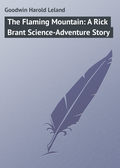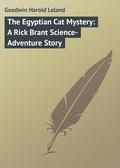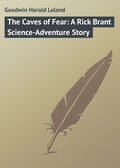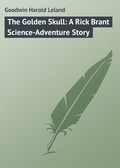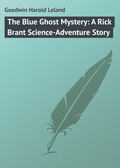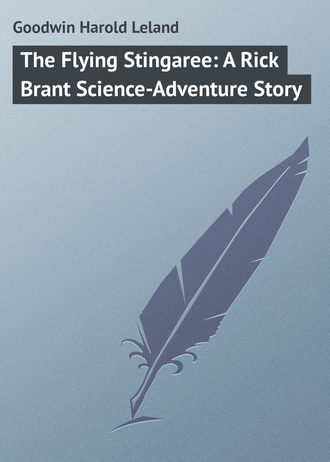
Goodwin Harold Leland
The Flying Stingaree: A Rick Brant Science-Adventure Story
CHAPTER IX
The Duck Blind
Orvil Harris had described the opening to the hidden waterway, but when the boys examined the line of reeds and marsh grass there was no sign of it. "He said thirty yards downstream," Scotty remembered.
Rick was at the wheel of the runabout. "Climb out on the bow," he suggested. "Take the boat hook with you. I'll just keep nosing in until we find it."
"Okay." Scotty took the short, aluminum boat hook from its fastenings in the small cockpit, stood up on the seat, and stepped over the windshield to the bow. For a moment he surveyed the shoreline from his higher vantage point. "There's a place that looks promising." He held the boat hook out like a spear, pointing.
Rick put the runabout in gear, and moved forward at idling speed. Looking over the side, he could see the bottom clearly. They were in only two feet of water, and the outboard was stirring up mud at the stern.
"No good," Scotty called. "That one doesn't go anywhere. Try upstream another six feet."
Rick turned the boat, watching for the opening Scotty had spotted. He saw it a moment later. "Looks too small," he called back.
"I think it opens up. Go ahead slow."
The runabout nosed up to the almost solid line of tall swamp grass, and Scotty leaned forward. "I think this is it. Take it easy."
The heavy grass rubbed on both sides of the boat, but nothing impeded its progress. The runabout pushed through the brown-green swale until it was almost enclosed by the grass. Then they were through, into a narrow channel with high grass on both sides. It was hard for Rick to see ahead because of the turns, and Scotty served as his eyes, motioning from one side to the other as the channel shifted.
Rick wondered if the sound of the outboard motor could be heard at the mansion, and decided it probably could not. The heavy marsh grass was a good sound baffle and the motor was relatively quiet. He leaned out, trying to see ahead. There were many birds in the swamp, and next to the boat a surprised snapping turtle looked up briefly, then scurried into the mud for cover.
The channel was narrowing now. Scotty looked back and drew his hand across his throat in the old signal to "cut." Rick instantly killed the motor.
"I'll pole us," Scotty said softly. He began using the boat hook as a pole, digging it into the bank and pulling the runabout ahead. Finally he stopped, and wiped sweat from his face. "This is about as far as we can go."
Rick took a swipe at a black fly that bit him on the arm. "Okay. Let's collect the gear and get started."
Scotty tied the boat to a projecting root while Rick took the equipment from its place under the seat and put it within reach on the forward deck, then jumped ashore. His feet hit apparently solid ground, but kept right on going down into a foot of ooze.
He lifted one foot that was a black blob of mud, tried to locate more solid footing on which to place it, and gave it up as a bad job. He leaned over and took the telescope case and tripod.
Scotty picked up the Polaroid camera and their binoculars and came ashore, sinking into the swamp as Rick had done. He grinned wryly. "We're up to our knees in this mystery already."
Rick lifted a foot with five pounds of mud clinging to it. "If we get in it up to our hips, we'll have a fine time getting out. How far do you think it is to the duck blind?"
"Maybe twenty-five yards. Not much more than that, maybe less. Come on."
Slowly, because of the need to haul each foot out of the mud, the boys started through the swale. The marsh grass was over their heads, forming a thick screen. The grass, however, was no handicap to the biting flies. Within a few seconds each boy was carrying equipment in one hand, using the other to fight off the swarms. An occasional mosquito added to their discomfort.
The muddy ooze thinned, then gave way to higher ground. The marsh grass was less thick and there was an occasional clump of willow. Rick studied the terrain ahead, and in a moment caught sight of dark-green foliage among the brown tips of swamp grass. In a few more feet he made out the tops of trees, and then the glint of sunlight on the aluminum of the antenna they had come to photograph.
Scotty had seen it, too. He stopped and the boys consulted.
"We're about twenty yards too far upstream," Scotty guessed.
Rick estimated as best he could. "I think you're right. Let's stay on high ground and head downstream a little. We must be almost there."
Scotty turned and Rick followed, waving uselessly at the cloud of insects. He was grateful for the advice Steve had given them to wear long trousers and long-sleeved shirts. If they had been wearing shorts, the insects would have had free access to several square feet of bare hide.
Both boys counted steps automatically, and after twenty paces downstream, Scotty turned toward the mansion once more. They pushed through the tall grass into thick mud, then into water with a deep muddy bottom. A few more steps and the grass thinned. Scotty stopped and motioned Rick back. They moved sideways, then forward again, and emerged with the duck blind between them and Calvert's Favor.
Rick thought to himself that it had been pretty good navigation, considering that most of the journey had been blind, in grass over their heads. Apparently Scotty thought so, too. He turned and gave Rick a big grin, then headed for the rear of the duck blind.
The water deepened, washing off some of the mud. Rick reached down and splashed a handful on his face. It was warm. He saw a wet black head emerge from under the duck blind and speed for shore. It was a startled water rat. Alerted by the small splash of their coming, the rodent decided to take better cover. Then they were at the corner of the blind where the entrance was located.
The floor of the blind was level with their chests. Rick looked in. There wasn't much space, since the blind had been built to provide only a place for hunters to sit, wait, and then shoot from kneeling or sitting positions.
Both boys put their equipment on the dry wooden floor. Then Rick swung himself up and pushed the equipment back to make room for Scotty. For a moment they sat on the floor, resting. Coming through the swamp had been exhausting work.
After a few moments' rest, Rick moved to the side of the duck blind and found a small opening, a square window about six inches on a side, that had apparently been made to give the hunters a view in that direction. The opening was near the forward, upstream corner, and it looked out on Calvert's Favor.
Merlin the mysterious and his two close companions were sitting under the willow tree enjoying something liquid from tall glasses. As Rick watched, a fourth man, evidently a servant, brought a tray on which a silver pitcher rested. The boy could see the trickles of water cascading down the outside, and knew they were caused by moisture condensing on the cold metal of the pitcher. He moistened his lips. A fine pair of dunderheads, he and Scotty were. They had come without even a canteen of water.
"Easy shot," he whispered to Scotty. "Let's set up and take the pictures, then get out of here. I'm getting thirsty just watching them."
Scotty adjusted the tripod, while Rick took the telescope out of its case with reverent hands. It was a beautiful and delicate piece of equipment, Steve's personal property, and he appreciated the trust the agent had placed in them by allowing its use. He fitted the instrument to the mounting screw on the tripod, then aimed it through the six-inch window. When he squinted through the eyepiece, he saw only willow branches, but, by keeping his eye in place and cranking the geared tripod head, he quickly aligned the telescope with the trio under the willow.
The telescope had a fixed focus, and was designed for looking at stars. Consequently, the field of vision was extremely narrow at the short distance across the water, and Rick could only manage to get Merlin and his small, insignificant-looking companion into the frame. What's more, they were upside down, as is common in reflecting telescopes. The boy knew there was an erecting prism in the case, a device that would put the image upright, but it couldn't be used with the camera. Anyway, it wouldn't matter, since the print could be turned over.
He studied the faces in the upside-down position. The telescope gave him an even better close-up than at the restaurant. Again he groped for the identity of the white-haired man, but it eluded him.
Scotty tapped him on the shoulder and motioned that the camera was ready. Rick moved aside and his pal quickly fitted the camera to the telescope and tightened the mounting rings. Rick nodded to indicate that the telescope was on target, and Scotty tripped the camera.
The advantage of the Polaroid camera is that the picture can be seen within seconds. Scotty quickly went through the simple routine, and within a quarter of a minute the boys were looking at the photo. It was an excellent close-up, but a trifle dark. Scotty opened the iris on the camera another stop and Rick rechecked the alignment. Scotty snapped the picture and processed it. This time it was perfect, only slightly hazy because of the rising heat waves across the hundred yards of distance.
Rick readjusted the telescope for a full view of the third man. His picture was added to the others. Scotty wiped both with fixative and put them on the floor to dry.
The antenna was next. Rick focused on it without difficulty, but the field of view was so narrow that he couldn't see all of it. They would have to photograph it in two sections, then fit the prints together.
Five minutes after their arrival at the duck blind, they were back in the swamp, the pictures protected in a plastic bread wrapper Rick had brought. They cut directly across the swamp and emerged, hot, sticky, and dirty, only a few yards from the boat. They stowed the equipment wordlessly, then poled backwards into the wider channel. It was too narrow to turn, so Rick started the motor and backed out with great caution.
Once in the clear, they headed at top speed for Steve's, tied up at the pier, and plunged into the water without even bothering to remove their clothes. Their only precaution was to empty their pockets.
Rick luxuriated in the coolness of clean water, then stripped to his undershorts and threw his sodden clothes onto the pier. Only when he was sure he had washed off the last of the clinging mud did he pull himself up to the houseboat cockpit, Scotty following.
They toweled and put on clean clothes, then carried the equipment back to the farmhouse. Two bottles of Coke apiece from the refrigerator had them feeling normal again. Over the last one, they studied the photos.
"I don't think we've ever known Merlin," Rick said thoughtfully. "We've seen him, but we don't know him."
Scotty scratched a mosquito bite. "Think he might be some kind of public figure?"
Rick looked up sharply. "I think you hit it! If that's true, we should be able to get him identified easily."
"Steve could do it through JANIG," Scotty suggested.
"It would take too long. He won't be home until tonight, and the picture wouldn't reach JANIG until tomorrow. Then it would take a day to check it out."
"Are we in a hurry?" Scotty asked.
Rick chuckled. "I am. But don't ask me why. Look, I'll bet Duke or Jerry could identify it by going through the newspaper morgue." Their newspaper friends were owner-editor and reporter for the Whiteside paper back home.
"They're on vacation," Scotty reminded him. Once each year, the paper was turned over to a friend of Duke's, a former newspaperman turned professor of journalism, who used the occasion to give some of his students practical experience.
That was true, Rick remembered. Neither Duke nor Jerry would be available. Who else did they know who could help? Suddenly he snapped his fingers. "I've got it! Ken Holt would help, if we could get the picture to him."
Ken Holt, the young newsman whose adventures were favorite reading for Rick and Scotty, had once asked Spindrift for help, and Rick had given him a set of pocket-size radio transceivers of the kind known as "The Megabuck Network."
"Sandy Allen is a photographer," Scotty pointed out. "He might know these people."
Rick took a chair next to the telephone and dialed the operator. "A person-to-person call," he stated, "to Mr. Ken Holt, at the Brentwood Advance, Brentwood, New Jersey." He put his hand over the mouthpiece. "Let's hope he and Sandy aren't off on an assignment somewhere."
Luck was on their side. Ken Holt was in, and he was delighted to be of help. "Put the picture in the mail," the young reporter suggested. "If you make it airmail, special delivery, we'll have it first thing in the morning. With luck, we might even get it tonight. We'll phone you as soon as we have an identification. Incidentally, the Megabuck units worked like a charm, as I told you when I wrote. Thanks a lot."
"Glad they were helpful," Rick replied. "We'll hurry to town and get the picture in the mail right away."
He hung up and nodded at Scotty. "We'll get the picture ready, and take it to town when we go to pick Steve up. If we're a little early, the letter probably will go out on the early evening plane to Washington."
Scotty nodded. "What time is it?"
Rick glanced at his watch. "Nearly three. We'll be ready to take off as soon as Steve calls, or doesn't."
"If he calls, that means he won't be back," Scotty reminded.
"No matter. We'll go to town anyway, and have an early dinner."
Rick had envelopes and letter paper on the houseboat. He wrote a brief note to Ken, addressed the envelope, and printed Airmail Special Delivery on both sides, then enclosed the best picture of Merlin and sealed it. Scotty spent the time on a small repair job, taping up the neoprene gasoline hoses that carried fuel to the houseboat motors. By the time he was finished, it was nearly four. The boys went into the house to wait.
Steve called on the dot of four. "Rick? … Steve. I'm sorry, fellow. I have a little more to do on this case, and I'll have to stay over. Everything going all right?"
Rick briefed him quickly on the day's events and Steve replied, "It takes about half an hour for a letter to make the early evening plane. Allow enough time."
"We will," Rick assured him. "Anything new on the sighting data?"
"Not yet. I sent the cards to the computing center, but they won't have time to run the data through until tomorrow or the next day. Make yourselves at home, and don't spend all your time on flying stingarees. Get in some fishing and swimming."
Rick assured him that they were enjoying the vacation and would try to get in some fishing. He hung up and turned to Scotty.
"He'll be in tomorrow on the same plane. He wants us to get in some fishing."
Scotty chuckled. "I thought he knew you better than that. Give you a mystery to chew on and there's no room for anything else in that thick Brantish skull."
"We'll solve this one," Rick said confidently. "Then we'll fish."
Scotty just grinned.
CHAPTER X
Ken Holt Comes Through
Somewhere in the oak trees across the creek a cardinal sang his lovely evening song. An osprey, etched in black against the dark blue of the sky, whirled in lazy circles watching the water below. A muskrat appeared briefly, his sleek head making a V of ripples in the calm water.
Rick and Scotty, sprawled comfortably in beach chairs on the lawn in front of Steve's house, sipped the last of their iced tea, and watched the movements and listened to the sounds in companionable silence. Both boys, admitting that, for the immediate present, they were slightly overdosed with rich food, had agreed to settle for a sandwich and iced tea. A brief stop at a store en route back from the post office had provided the necessities.
Rick was physically relaxed, but mentally active. It was characteristic of him that he never let go of a puzzle until he had found a solution, or had tried all possibilities and been forced to admit defeat. He was a long way from defeat at the moment. The case of the flying stingaree was just getting interesting.
"What are the flying stingarees?" he asked quietly.
Scotty shifted position in his chair and looked at Rick quizzically. "You don't expect an answer. But I can tell you a few things they are not."
"Tell away," Rick urged.
"They are not flying saucers, aircraft, kites, sting rays, birds, fish, or good red herrings. Beyond that, deponent sayeth not, as the legal boys say."
"Uh-huh. And why are they not flying saucers?"
"For the same reason they're not aircraft. If you recall all the talks with people who've seen them, they don't maneuver, and they don't travel very fast. They appear – or they're noticed, let's say – and they just get smaller and smaller until they vanish. They move, but not much."
Rick nodded. "The circle we drew around all the sightings doesn't cover a very large territory. All the sightings have been within that circle. People had to look toward Swamp Creek to see the objects. Yet, they did something interesting. They grew smaller. What makes things seem to grow smaller?"
"Apparent size decreases with distance," Scotty replied promptly.
"Sure. And how do you get distance, when the sightings are all within a circle only a few miles in diameter?"
"Only one way. With altitude. The things had to be going up."
Rick agreed. "That's how I figure it, too. It also explains why the circle of sightings is so small. Above a certain altitude, the objects are no longer visible. Or they're not so visible that they attract attention. I suppose we could work out some calculations. How large an object can be seen readily at what distance? Then we could apply a little trigonometry and figure their size."
"We could," Scotty agreed, "but do we need to? Let's assume the object you saw was typical. How big was it?"
Rick thought it over. He had had only a quick glimpse, and the background had been the gray of the storm. His vision had been obscured because of the rain. "Maximum of ten feet across and maybe eight tall. It was probably less."
"Okay. So the reason sightings are confined to this area is because the objects are fairly small. When people see them, they're relatively close, and fairly low. Even the small planes that fly from the airfield are much bigger than the flying stingarees, but when the planes go over at about five thousand feet, they seem tiny. At that altitude the flying stingarees must be at the limit of really good visibility."
"I read you loud and clear. So the objects are sent from Calvert's Favor, and they climb. They don't climb straight up, though. The wind carries them. The reason I think so is that the one I saw must have been driven by the wind, right down the creek toward me. It didn't climb until it got away from the funneling effect of the creek and into the river, then it went up pretty fast. At least it seemed to have risen fast when I looked over the top of the boat at it."
Scotty crunched an ice cube. "We're getting somewhere. There's only one kind of unpowered, vertical rising thing I know of. Are you with me?"
Rick finished his drink. "Balloon," he said crisply.
"On the beam," Scotty approved. "The only thing that doesn't fit is the shape."
Rick asked, "What's a balloon? It's just a gas-tight container. We're used to thinking of balloons as spheres, because it's the most efficient shape for internal pressure. But a balloon can be any shape. Another thing – balloons for high altitudes aren't fully inflated on the ground. Maybe the flying stingarees have a different shape when they get higher and in less dense atmosphere where the gas distends them."
"An odd shape could be used as camouflage, too, if you didn't want people to recognize the balloon. But why would a strange assortment of characters like Merlin and company send up balloons?" Scotty wondered.
Rick smiled. "I've been wondering that myself. Would they send up a balloon that didn't carry something?"
"I don't know. Was the one you saw carrying anything?"
Rick sat upright. "Maybe it was! You know, I haven't even thought of it since then, but I think there was a splash when it went by. Something sort of clanged off the rail over me, even if it didn't dent the rail. Do you suppose the thing dropped its payload right next to us?"
"You'll have to decide that," Scotty said. "If you heard something bounce off the rail, then a splash, I'd say there might be a pretty good chance that's what happened. I couldn't see any marks on the rail when we looked." They had checked the rail during the first day at Steve's.
Rick closed his eyes and made himself remember what it had been like when he went down the catwalk to the bow. His mind drew a picture, and he saw himself bent forward into the wind. In his memory he felt the slashing rain, the slipperiness of the wet anchor line. He could visualize the water whipped into dimpled wavelets by wind and rain. He saw the flying stingaree loom, and saw himself dropping flat. There had been a clang as something hard hit the rail! There had been a splash!
He went over it again, searching his memory for details he had forgotten or which had only registered vaguely at the time. He studied the shape and texture of the object he had seen so briefly. He saw its red eyes open and glare at him, saw the extended claws reaching…
He came out of his chair with a yell, arms extended to defend himself.
Scotty stood next to him in the darkness. "Hey, take it easy, Rick! I didn't think I'd startle you so when I shook you."
Rick stared. "Did I fall asleep? I must have. I was trying to remember, and suddenly I was dreaming about red eyes and claws – "
Scotty laughed softly. "If you've got to have nightmares, at least do it in comfort. Let's go to the boat and go to bed."
Rick dreamed no more of the flying stingarees. In the morning he couldn't have said what his dreams had been about, except that they had been pleasant.
In the bright glare of morning, the whole thing seemed dreamlike. It was preposterous to imagine that flying objects, probably balloons shaped like stingarees, were launched from a famous mansion that dated back to the days of the early Maryland colony. But the sighting data couldn't be ignored. Dreamlike or not, something strange was going on at Calvert's Favor.
The boys breakfasted in the farmhouse, reducing Steve's supply of eggs substantially and wiping out the bacon reserve. "We'll have to shop sometime today," Rick observed. "Steve has plenty of food here, but we don't want to use it when there's a store so close."
"Sure," Scotty agreed. "But when? It may have to wait until we go after Steve. We can't very well leave the house, or at least both of us can't. Ken Holt might call."
Rick nodded and poured himself a cup of coffee. He had thought of that. They had to give Ken time to get the picture and check it out. By the latest, they should hear before noon – unless the job turned out to be very difficult. That would leave four hours before they would have to leave the house to pick up Steve. Four hours was time enough for the investigation Rick had in mind.
After breakfast they settled down with the data sheets and notebook to review them once more. But only one additional fact emerged. Two people thought, but weren't absolutely sure, that they had seen a spurt of fire from the flying stingarees. Rick wondered if they had seen a sudden flare of sunlight from some highly reflective part of the object.
It was two minutes before nine when the phone rang. Both boys jumped, but Rick got there first. "Hello?"
"Rick? … This is Ken. Why don't you give us something hard to do? The envelope arrived three minutes ago, and I was just taking the picture out when Sandy walked in. He took one look and asked what I was doing with a snapshot of Lefty Camillion. The hair is white and the mustache is gone, but it's Lefty."
Rick gasped. "My sainted aunt! Of course! I should have known it myself."
"There's more. Sandy recognized Lefty's small friend too. This is an odd one, Rick. The man is Dr. Elbert K. Drews. He was fired six months ago by Space Electronics Industries. It was a big story for us, because the plant is located in the next town. The reason he was fired came out during the monopoly investigations. Turned out he had been selling the firm's industrial secrets to its competitors. It was a shock, because he had such a big reputation as an electronics wizard. He got some kind of national prize a year ago for developing a new high-speed system for something. Let's see – here's my note. It says, 'Dr. Drews was the originator of a new and unusual system for the rapid telemetry of data from space. The system is considered remarkable for its compactness and speed of operation. The ground installation is scarcely larger than a console-model television set.' Hope that means something to you, Rick."
"Thanks a million, Ken. It seems to fit, but I'm not sure how."
"Let us know if you find out. And if we can do anything else, you know the phone number."
"We'll call if anything comes up. Thanks again, Ken."
Rick hung up and stared at the phone thoughtfully, trying to fit this new information into the scheme of things. Scotty had been sitting on the edge of his chair since the conversation started. He said, with some exasperation, "Well? Out with it!"
"Mr. Merlin is Lefty Camillion. His pal is an electronics wizard who was fired by Space Electronics Industries for selling industrial secrets to the firm's competitors." Rick rapidly sketched in the rest of the conversation.
Scotty sank back into his chair. "His hair was black, and now it's white. He must have been keeping it dyed, and decided to go natural. And he shaved off that mustache. Probably that was dyed black, too."
"You're right." Rick shook his head in dismay. Lefty Camillion, whose first name was Thomas, was a notorious crime syndicate leader who had come into prominence about two years ago during Senate investigations of racketeering. In three days Camillion had become a television personality, of sorts, when it became clear that he apparently was responsible for a number of murders and a thousand lesser crimes, although he himself had not done the actual killings. There was insufficient evidence to jail him, but enough to deport him. He dropped out of sight while his lawyers were fighting the deportation proceedings. Now he had shown up again, on the Eastern Shore.
"A crime syndicate chief, a crooked scientist, flying stingarees, an old mansion, a peculiar antenna, and a missing crabber. What does it add up to?" Rick demanded.
Scotty shrugged. He didn't answer. There was no answer – yet.



